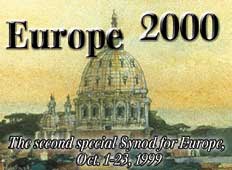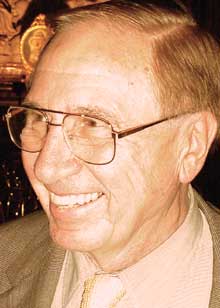

 |
 |
|
|
Veteran Rome correspondent returns to assess church By THOMAS C. FOX 
One of the pleasant surprises in Rome this fall was running into Robert Blair Kaiser, who covered the Second Vatican Council for Time magazine. In the 1960s, Kaiser joined forces with Redemptorist Father F.X. Murphy, (Xavier Rynne) and a band of mostly European journalists to breach the secrecy of the Council and tell the world that something special was going on in the church, something called aggiornamento. The world seemed fascinated with that attempt to update a church once thought unchanging and unchangeable. Time made Pope John XXIII their Man of the Year in January 1963 for his efforts to lead the church into what the council fathers chose to call “the modern world.” And Kaiser’s book on the council’s first session, Inside the Council, became a number one best seller in London and Dublin. So what is Kaiser doing in Rome now, almost 35 years later? Glory be, he’s working for the opposition now, a “special correspondent in Rome” for Newsweek, and writing a book under contract to Knopf on the future of the church. He laughed when I asked him what after all these years was different about Rome and the Vatican. “As far as the Vatican’s way of dealing with the press is concerned,” he said, “not very much. It’s true that the Vatican has a busy press office that churns out rivers of words every week. This is progress of a sort. But it’s pretty much of a flim flam. The powers that be still think and act like viceroys of a monarch, and the press policy set down for the European Synod proves that the last thing they want to do is share what they are doing with the people.” Kaiser continues, “The Fathers of the Synod are encouraged to think they have two audiences. They can speak freely to their fellow bishops -- behind closed doors. But they cannot hand out their texts to the press (and therefore to the general public). What the press gets are pale summaries. If any member of the press complains, the official line is that the Fathers themselves write their own summaries. But the unwritten understanding is that any prelate who writes a summary that gets too specific is breaking the rules of the club.” What’s the big secret? “God knows it’s not what they are saying. The theme of the synod is “Jesus Christ the Hope of Europe” and you’d think the Vatican would be only too eager to get that message out to people through the representatives of the mass media who are here and willing enough to report what they hear.” If it’s not what the bishops are saying, then what is the Vatican worried about? Kaiser says, “It’s the process itself. Making yourself accountable to the press is something that men and women do in a democracy. And that’s the last thing in the world most of these prelates want to admit, that the church is a democracy.” Well, is it a democracy? Kaiser smiles ruefully. “Today, the church is less democratic than it was during Vatican II. (But not less democratic than it was in the first six centuries of the church, when priests and people elected their own bishops. The first bishop in US history, John Carroll, was elected by a vote of all the priests in the new nation.) Huge majorities at Vatican II advocated a measure of democracy, even though they had to mask their meaning with a code word -- collegiality. Pope Paul VI carried on with that democratic spirit by instituting these special synods of bishops, whom he gathered together to help him better serve the people of God. But then Pope John Paul II turned the synods into cheering sections for himself and showcases for his favorites.” Showcases? Kaiser says that pope has picked certain prelates to demonstrate their brilliance and their eloquence to the rest of the bishops, and particularly to the cardinals who will be voting for his successor. Who was being showcased in this synod? Kaiser says, “It looked like Antonia Maria Rouco Varela, the cardinal-archbishop of Madrid. He was tapped to be the official relator or reporter for the synod, slated to give three major speeches at the beginning, middle and the end of the synod.” A good man? “Undoubtedly,” says Kaiser. “In the eyes of the pope, anyway.” Meaning? “Rouco Varela is a man of the law, canon law. I wonder whether Catholics think they need a lawyer running the show.” What does the church need? “As a reporter,” said Kaiser, “I don’t have to give you my opinion. Almost everyone I have interviewed for my book on the future of the church wants to see a pope who is less of a control freak, someone who will let bishops be bishops, someone who isn’t constantly wagging his head and shaking his fingers at the people.” Is that how you see Pope John Paul II? “More often than not. He likes to bully people. I have never seen him as very Christ-like. More like a Charlemagne. Or a St. George slaying the dragon.” You make it all sound so political. “Well,” says Kaiser, “this is the only part that’s reportable. I was caught up short the other day on a train ride out of Rome. I was practicing my Italian on a lawyer sitting across from me and when he asked me what I was doing in Rome, I told him about the book on the future of the church. He seemed puzzled. I explained, ‘The future of the church depends pretty much on who the next pope will be.’ ”He nodded. But a woman sitting next to him said to both of us, ‘Wrong. The future of the church depends on the Holy Spirit.’ Of course, she is right. Now if I could only interview the Holy Spirit.” Fox is NCR publisher and can be reached at TCFOX@aol.com National Catholic Reporter, October 1999 |